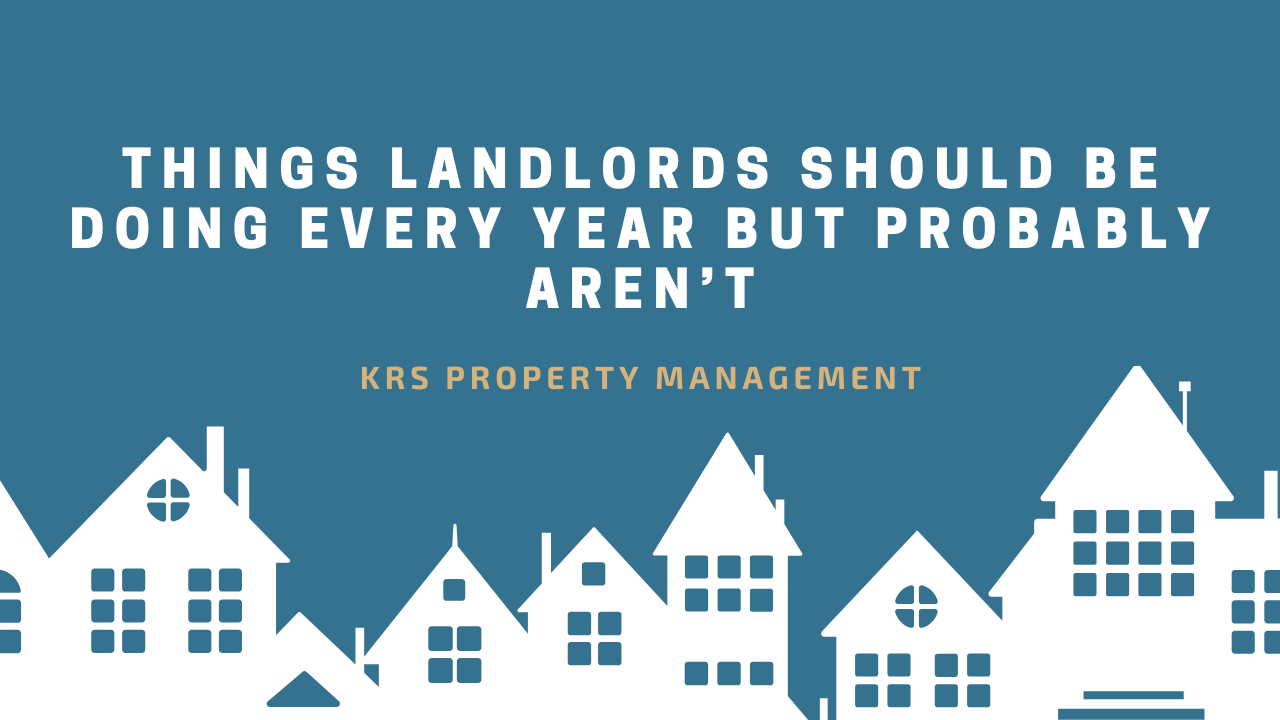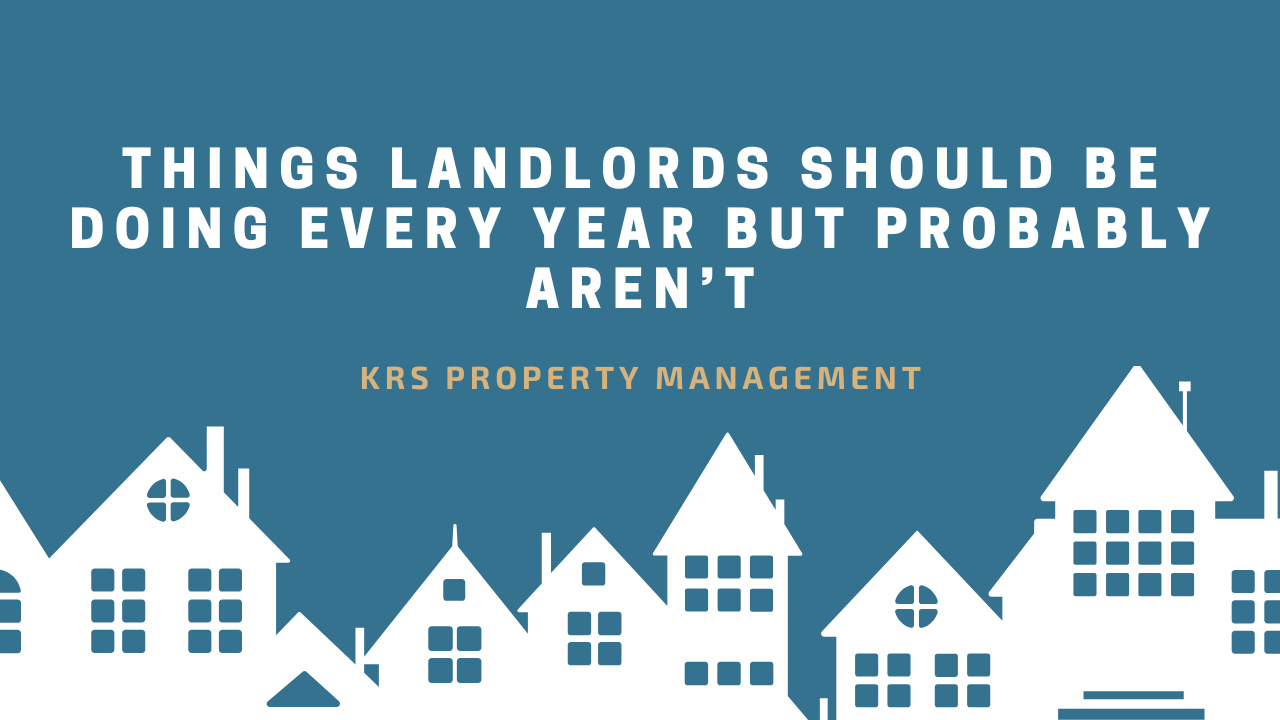
Yearly Checklist: Landlord Responsibilities
When you own a rental property, it’s easy to get caught up in the day-to-day operations—collecting rent, managing maintenance requests, and screening prospective tenants.
But property ownership is a long-term investment, and maintaining its value requires more than reactive management. There are key annual tasks that often go unnoticed or get pushed aside, yet skipping them could cost you in the long run.
From the experts at KRS Holdings, here’s a checklist of the yearly responsibilities landlords should be prioritizing to ensure their rentals stay legally compliant, financially optimized, and well-maintained.
Review Your Lease Agreements
Even if your lease was ironclad when first drafted, laws change—and so do your needs. It's smart to review all lease agreements on an annual basis to ensure they comply with current local, state, and federal landlord-tenant laws. Doing so protects you from potential legal issues and allows you to make updates based on lessons learned from the past year.

Maybe you had trouble with noise complaints, unauthorized pets, or unpaid utilities. If so, this is your chance to clarify rules or adjust clauses that were previously vague. Reviewing leases also ensures you’re aligned with fair housing requirements and current rent control ordinances, if applicable.
Update Your Rent Prices Strategically
Market conditions shift, and your rental rates should reflect the current demand and value of your property. Annually reviewing comparable listings in your neighborhood helps you stay competitive while ensuring you're not leaving money on the table.
However, raising rent just for the sake of profit can backfire if it pushes reliable tenants out. A better approach is to weigh rent increases alongside upgrades or added services. An updated kitchen, smart home features, or included lawn care could justify a higher price while enhancing resident satisfaction.
Check Your Insurance Coverage
Many landlords take a "set it and forget it" approach to insurance. But as property values, replacement costs, and risks evolve, your coverage should be reviewed each year. Contact your insurance provider to reassess your policy’s adequacy and confirm that you’re fully protected.
You may discover you're underinsured, or on the flip side, paying more than necessary for outdated or excessive coverage. It's also worth evaluating whether you need additional protection like rent loss coverage, flood insurance, or umbrella policies—especially if you’ve added assets or made improvements.
Conduct Annual Property Inspections
Routine inspections are among the most powerful tools a landlord has for preserving property conditions and ensuring tenant accountability. Once a year, schedule a formal property inspection to assess the physical state of the rental. This includes checking the roof, HVAC systems, smoke and carbon monoxide detectors, plumbing, and other critical infrastructure.

Inspections allow you to spot minor issues before they evolve into costly repairs. Leaks, faulty wiring, or signs of pest infestation can be caught early and addressed proactively. Additionally, it’s a good time to make sure your tenants are following lease terms, such as proper trash disposal and avoiding unauthorized modifications to the unit.
Get A Free Rental Analysis Today!
Refresh Your Vendor List
Reliable vendors—plumbers, electricians, cleaners, landscapers—are essential to keeping your property running smoothly. But over time, costs can creep up, or quality can slip. Once a year, take stock of your service providers.
Are they responsive? Is their pricing competitive? Are there new businesses in the area offering better value or more comprehensive services? Building relationships with dependable, fairly priced vendors ensures you’re prepared when urgent issues arise.
Conduct a Safety and Compliance Audit
Landlord responsibilities include ensuring the safety and habitability of your properties. Make it a habit to conduct a compliance audit at least once a year. Verify that your smoke and carbon monoxide detectors are functioning, fire extinguishers are up to date, and emergency exits are accessible.
Check that your property aligns with local health and safety codes, including proper ventilation, sanitation, and water heater settings. Failing to comply can result in fines or worse, accidents that could’ve been prevented.
Evaluate Your Financials
Tax time isn’t the only time you should be looking closely at your books. Once a year, take a deep dive into your financial reports to evaluate performance. This includes your profit and loss statement, balance sheet, and cash flow reports.

Look for trends in expenses, rent collection, and vacancy rates. Are certain months costing you more in maintenance? Are you maximizing tax deductions? An annual financial review can guide budgeting decisions and reveal opportunities for increasing income or reducing waste.
Reassess Your Property’s Curb Appeal
First impressions matter—especially in rental properties. Each year, step outside and view your property as a prospective tenant might. Small improvements such as fresh mulch, new house numbers, or power washing can dramatically improve your property’s appeal.
Even if your unit is occupied, good curb appeal keeps your property’s value high and makes re-renting easier when the time comes.
Stay Informed on Local Laws and Market Trends
Rental property laws are not static. Rent control, eviction regulations, zoning codes, and tax laws often change from year to year. Make it a yearly habit to check for updates from your local housing authority, real estate board, or landlord association.
At the same time, track market trends such as population shifts, new developments, or shifts in demand for certain amenities or unit types. This knowledge allows you to adapt your strategy and stay ahead.
Touch Base With Your Tenants
Annual check-ins with tenants can strengthen relationships and reduce turnover. Even if everything seems fine, reach out to ask how they’re doing and if they have suggestions for improvements.

This opens the door for tenants to report small issues before they become major problems. A responsive and proactive landlord is more likely to retain good tenants and avoid costly vacancies or conflicts.
Consider Preventive Maintenance Scheduling
Rather than waiting for something to break, aim to prevent it. Each year, schedule preventative maintenance tasks such as servicing the HVAC, flushing the water heater, clearing gutters, and inspecting weather stripping.
This approach extends the life of your property’s systems, saves you money over time, and provides a better experience for tenants who don’t have to deal with mid-season breakdowns or inconvenient repairs.
Work with a Property Management Company
One of the most effective ways to ensure you don’t miss any of these important annual tasks is to work with a professional property management company. These companies bring experience, resources, and systems that streamline operations.
A good property manager can handle lease renewals, inspections, vendor coordination, rent collection, legal compliance, and more, freeing up your time and reducing the risk of costly oversights. They also have access to market data that helps optimize pricing strategies and fill vacancies faster.
Final Thoughts
Owning rental property isn’t a “set it and forget it” investment. Landlords need to commit to regular, proactive upkeep to protect their income and asset value. By being consistent and thorough with these responsibilities—and leaning on expert help when needed—you’ll not only boost the long-term profitability of your investment but also create a better experience for your residents.
Partner with KRS Holdings to ensure a smooth rental experience.







